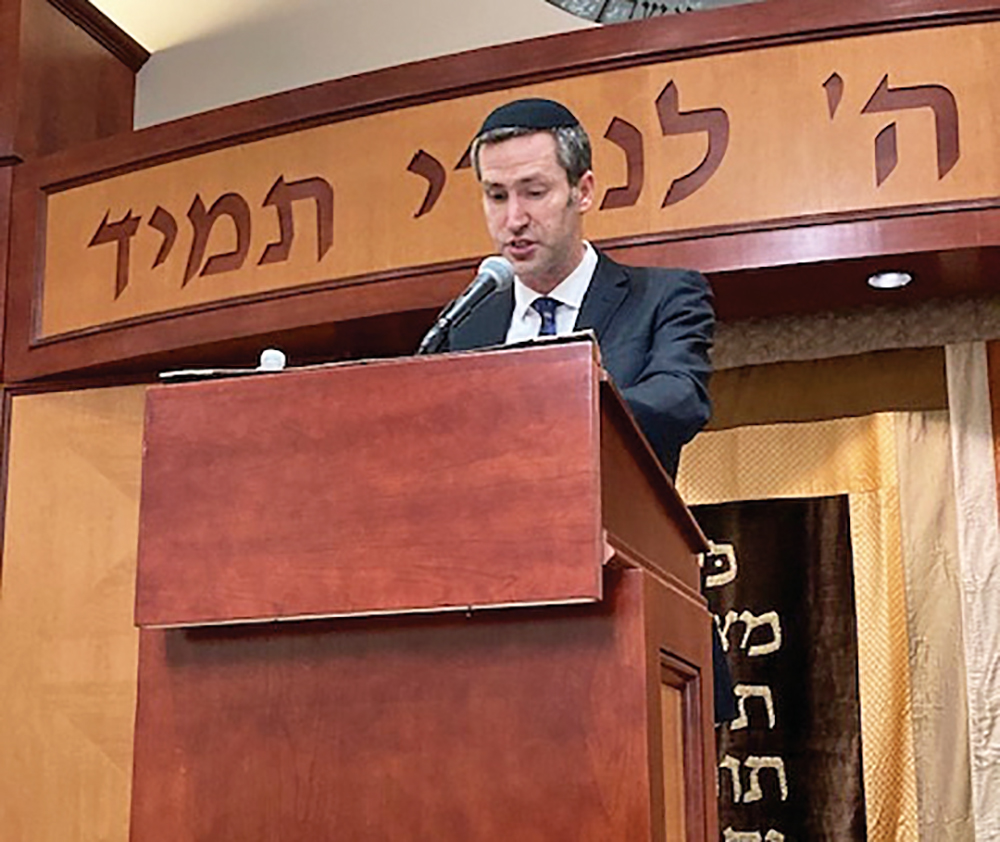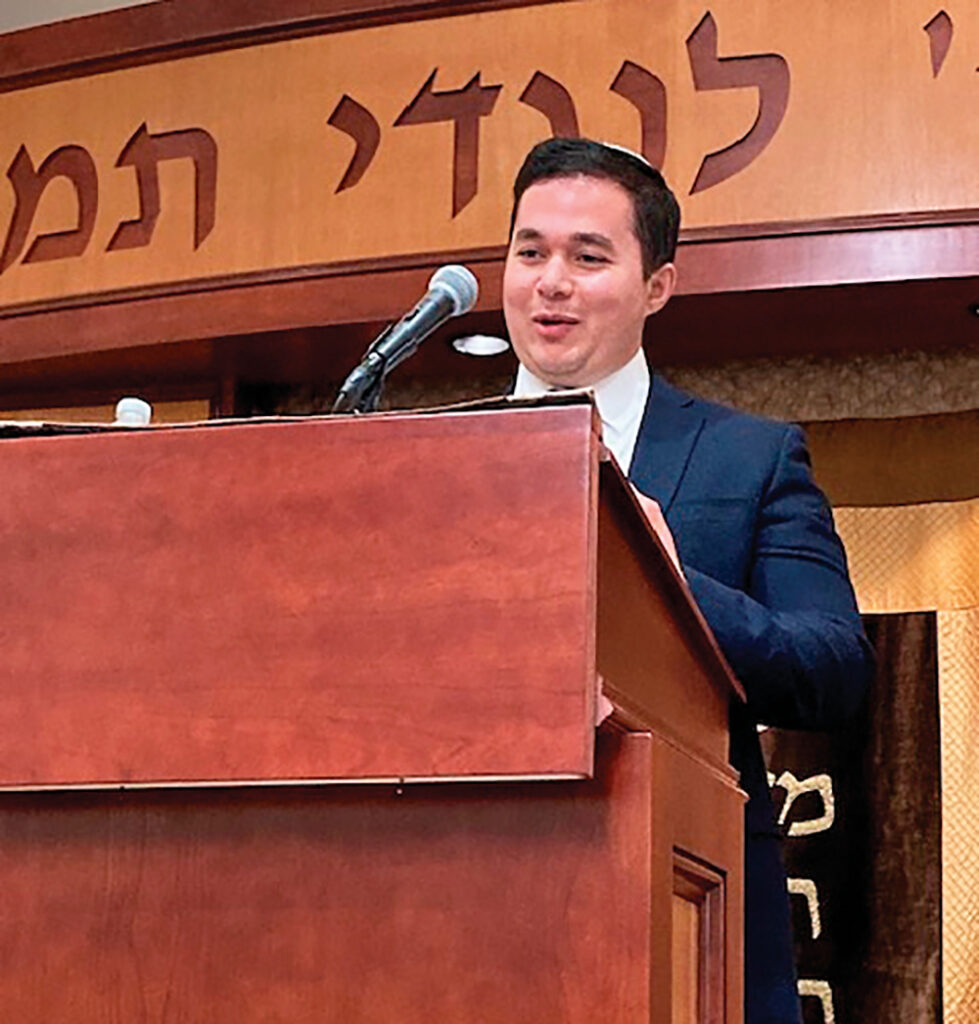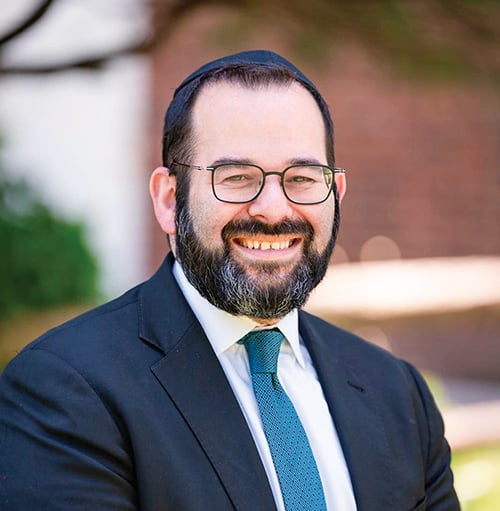
On Thursday evening March 7, while many tuned in to the State of the Union address, a packed house at the Young Israel of Teaneck came out for a very different address. Organized by Adult Education Chair Dr. Daniel Lowe, Likud MK Dan Illouz delivered prepared remarks for 30 minutes, followed by a half-hour of Q&A that proved to be enlightening.
The evening began with Rabbi Binyamin Krohn’s introduction of the featured speaker as well as acknowledgement of several guests, including Teaneck Mayor Michael Pagan, several members of the town council, and the Jewish Federation of Northern New Jersey’s CEO and president, Jason Shames and Dan Shlufman.
Rabbi Krohn shared that Illouz, who made aliyah from Montreal in 2009, received a law degree from McGill University and one in public policy from Hebrew University. His keen interest in government service culminated with his joining the Knesset in 2023. Illouz serves on the Foreign Affairs and Defense Committee and chairs the subcommittee for international trade. He has also been a government voice for Israel since the war began, doing interviews with Fox News, CNN, The Hill and more.
Illouz began by saying that the Jewish people are at a critical juncture in Jewish history, a turning point that began exactly five months earlier. “It was not just the number killed on Oct. 7, but the way they were killed,” adding that the speaker of the Knesset would say it was as if the Holocaust had returned for one day. He went on to stress that Israel has only one choice, to eradicate evil just like the free world did with the Nazis and the coalition of nations did with ISIS. If Hamas were allowed to regroup, not only would Israel be on the line, but the entire Western world. “Hezbollah and Tehran are looking carefully at how we respond,” he added.
lllouz shared that as a leader of the Abraham Accords caucus in Israel, people have asked him about the effect of the war on those relationships, especially negotiations with Saudi Arabia. He explained that the only way to move forward with the talks is to win the war, stating that Bahrain and others have messaged that they want Israel to defeat Hamas as much as Americans do in order for the Middle East to proceed on a positive path. Additionally, those nations who have been considering a peace deal with Israel want to do so with a strong country.

Illouz concluded by speaking of the silver linings, using the common refrain, unity. He said the leftist kibbutzniks never thought settlers would drop everything to come to their rescue. Connections between the groups remain alive to this day. He also spoke of left- and right-wing Israelis serving in the same tank, concluding that the extraordinary unity that began unfolding on Oct. 7 still exists five months later. On a personal note, he said his decision to make aliyah was done from an historical perspective, given that the Jewish people are living in such an incredible period of time. He ended by emphatically stating “We will win.”
At the start of the questions and answers, Illouz challenged the audience by saying, “Ask me anything and I mean anything.” The very first question was “How can we achieve the twin goals of winning the war and bringing the hostages home?” His response was “You’ve probably asked me the most difficult question of all.” He went on to state frankly that he had been opposed to the first hostage deal, believing that it was dangerous at the time to pause the military operation, but added that he had been wrong. He added that the more pressure Israel exerts militarily on Hamas, the more it will pull back from its negotiating demands, adding, “the contradiction between the two goals are less stark than they seem.” He also shared that as soon as Prime Minister Netanyahu mentioned the goal of entering Rafah, Hamas became worried.
Other questions focused on how Israel will be able to totally eradicate Hamas and what will be considered a victory when the war is looked back on in a year or two. Illouz said that at a minimum, all the remaining Hamas battalions, which are now in Rafah, must be defeated so that Hamas will no longer have military capabilities. Although there will likely always be a guerilla presence, if Hamas can still launch rockets into Israel, Israel will not have won. Additionally, Israel will need clear military control over Gaza so that no other groups can build weapons. He also stressed the goal of deradicalizing the population, saying that the Emirates were able to do it quickly by introducing a different educational system but adding that it will be a longer process for Gaza.
One audience member asked, “If we are fighting for the free world, how do we get our message out to them?” Illouz responded by saying that he couldn’t recall a time when support from the free world for Israel was stronger, pointing out that, “You don’t hear many countries demanding a permanent cease-fire.” His caveat was “The world hasn’t turned on us — yet.”
When asked what community members can do as Americans to help the cause, Illouz said the Jewish community has a lot of influence on its elected officials, adding that it wasn’t something he realized until he joined the Knesset and was regularly contacted by constituents. He also spoke of the power of social media, which allows every person to be their own little media outlet, and suggested investing in Israel’s financial future.
Things got interesting when the topic of Hezbollah was raised. Illouz said Israel was already at war in the north, with a full-scale war inevitable. He went on to say, “Knowing their ideology, we can no longer afford to ignore them,” admitting it had been a mistake to let Hezbollah grow to their current capabilities, placing every city in Israel at risk.
As to why Iran held Hezbollah back from joining Hamas at the outset, Illouz offered that other than resentment that Hamas wasn’t fully forthcoming with its intentions, there were two potential reasons, both of them ominous. First, Iran wants Hezbollah to remain strong as protection for their nuclear aspirations, and secondly, Iran wants to complete their nuclear program and will need a strong Hezbollah to join them at the appropriate time. He added that Israel had considered being aggressive with Hezbollah after the initial Hamas attack, but decided against it, a decision for which he concurred. He feels Israel is at the point now, given Iran’s closeness to becoming a nuclear power, that it would be detrimental to continue to wait it out with Hezbollah. “If we are at an existential risk, we can do what we need with or without world support, as any nation would.” Following the address, as a few people lingered, someone asked about the level of remaining firepower to confront Hezbollah given the massive amount used against Hamas. Illouz answered that it wasn’t an issue, sharing that one of the lessons Israel has learned over the years following previous enemy encounters was to start manufacturing weaponry locally.
Robert Isler is a marketing research analyst and freelance writer who specializes in Jewish issues. He can be reached at [email protected].












